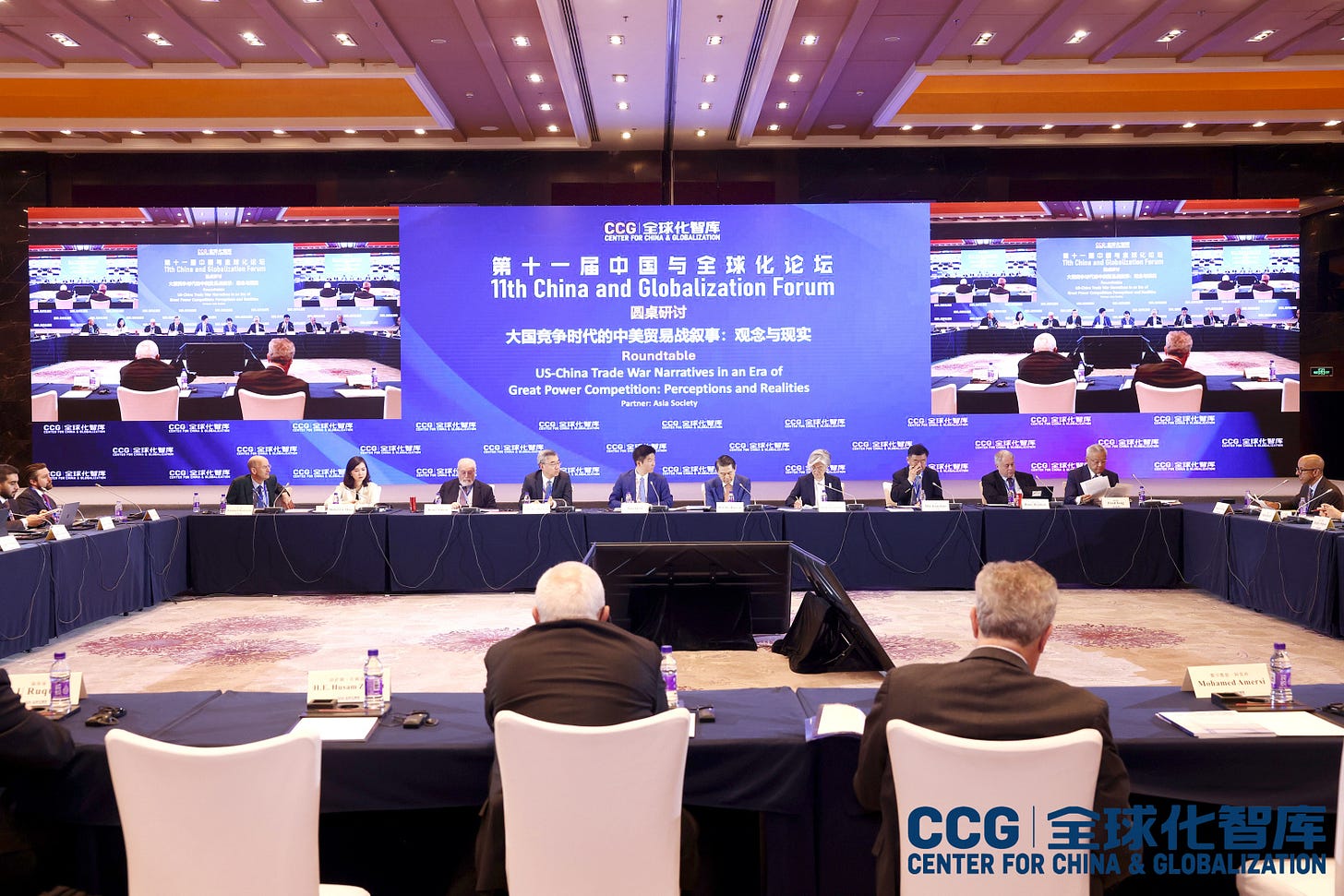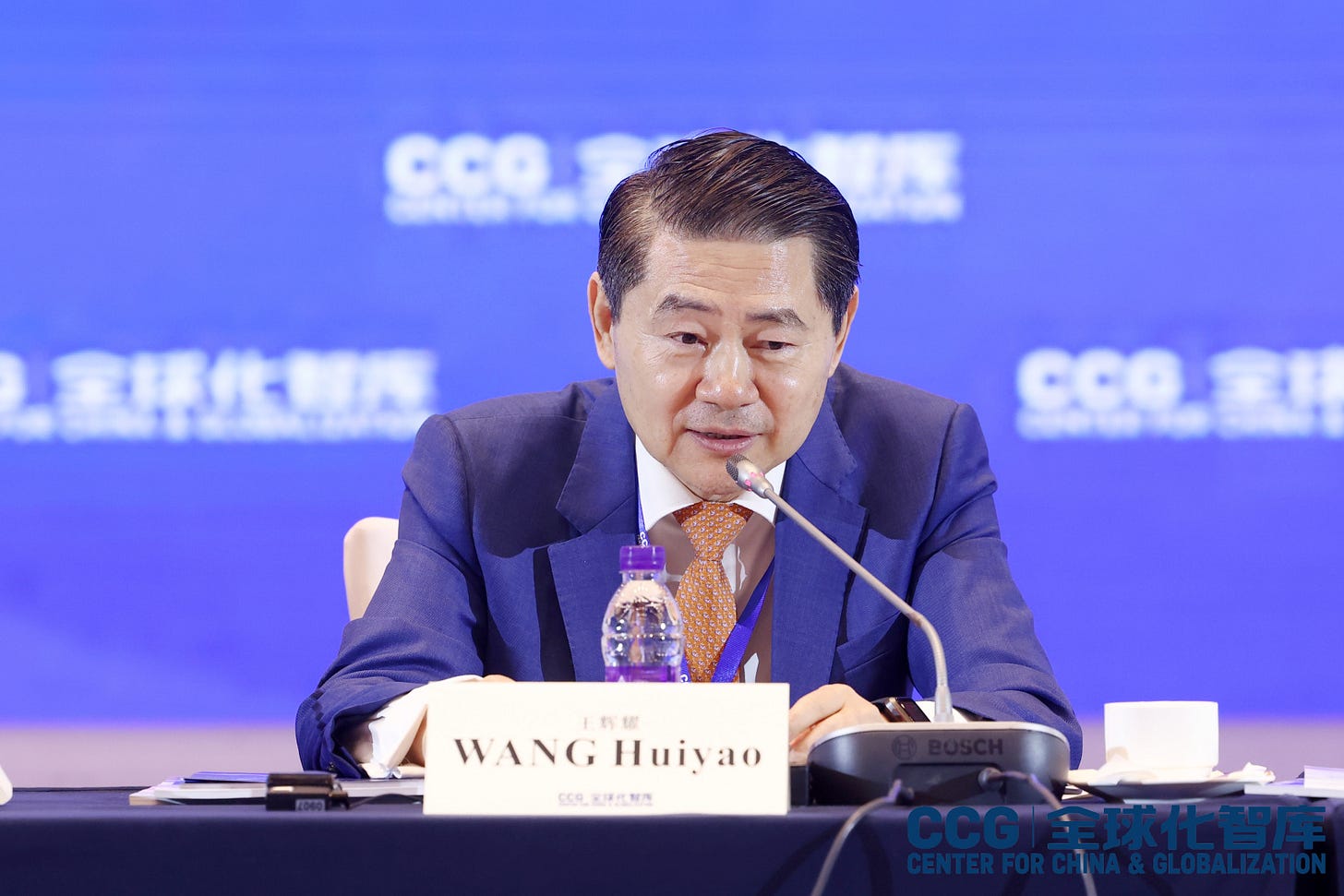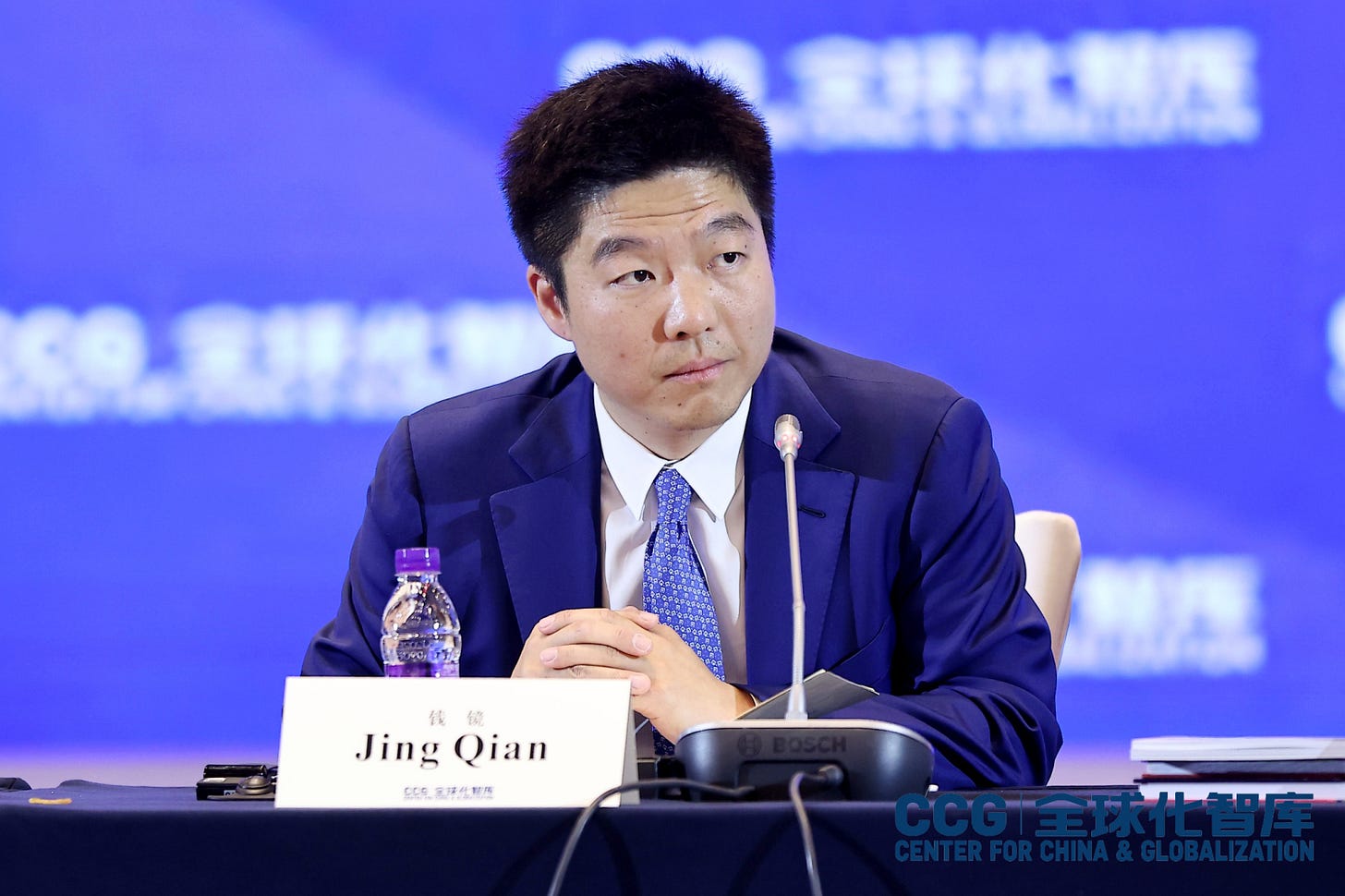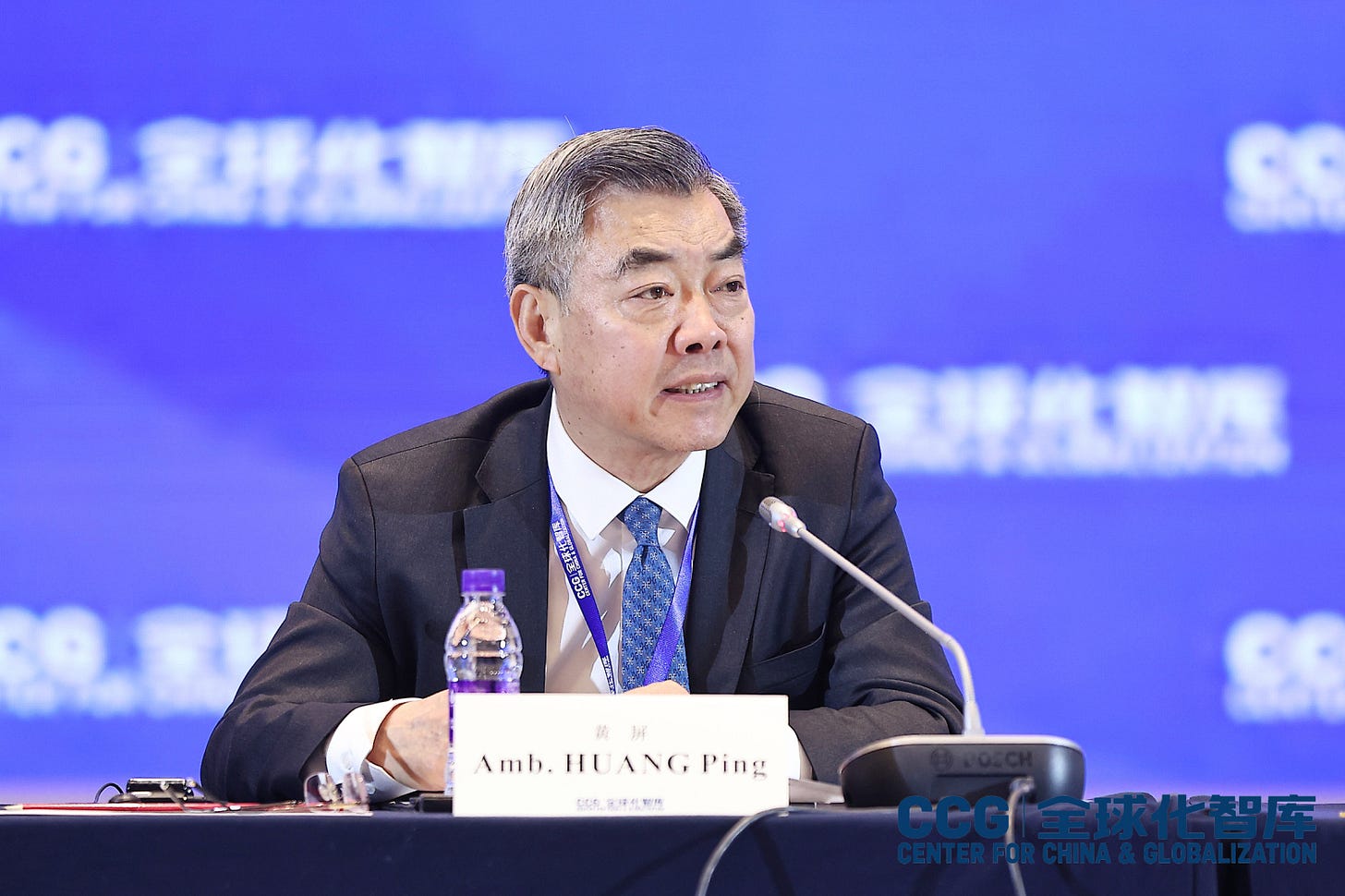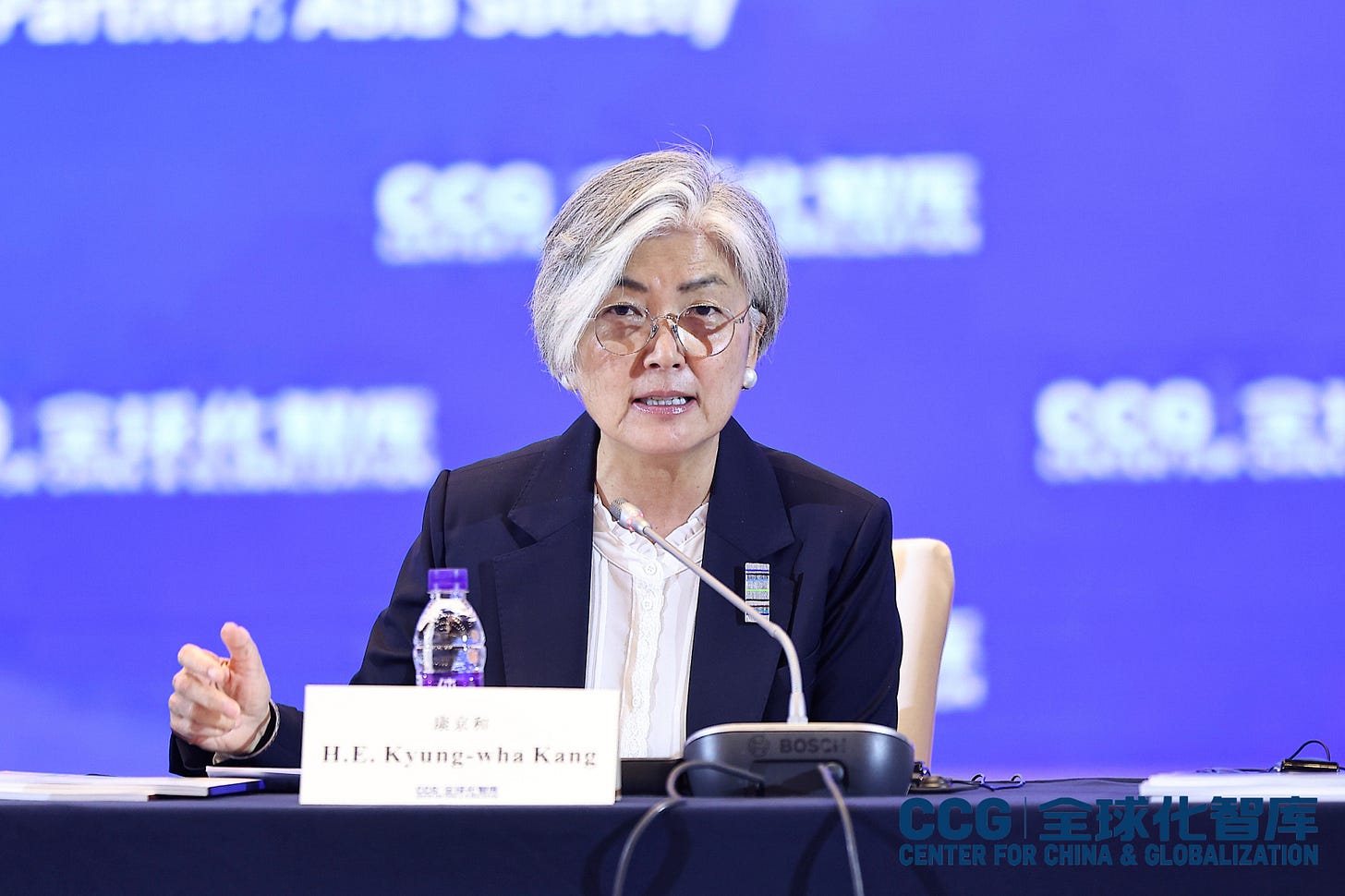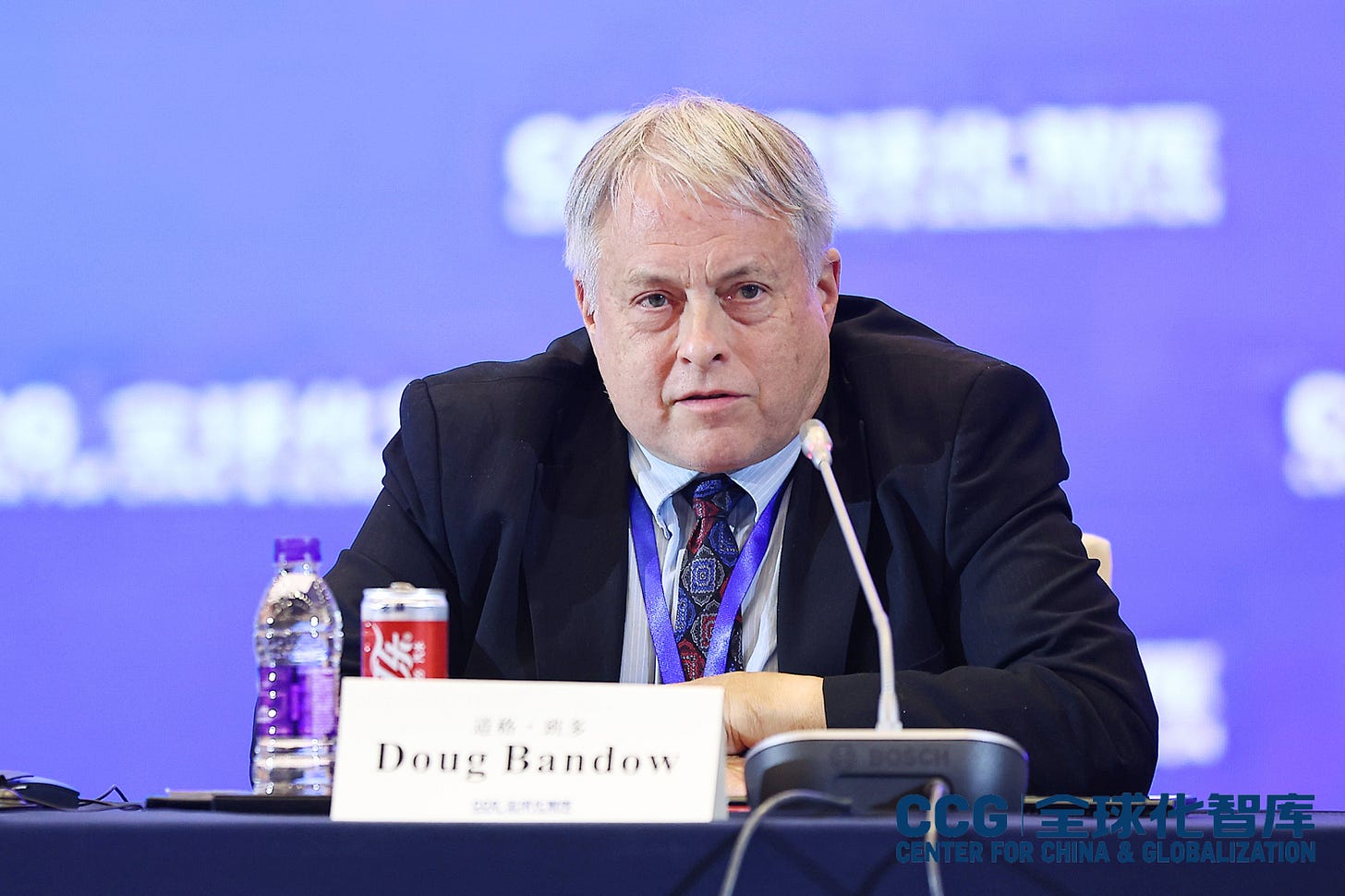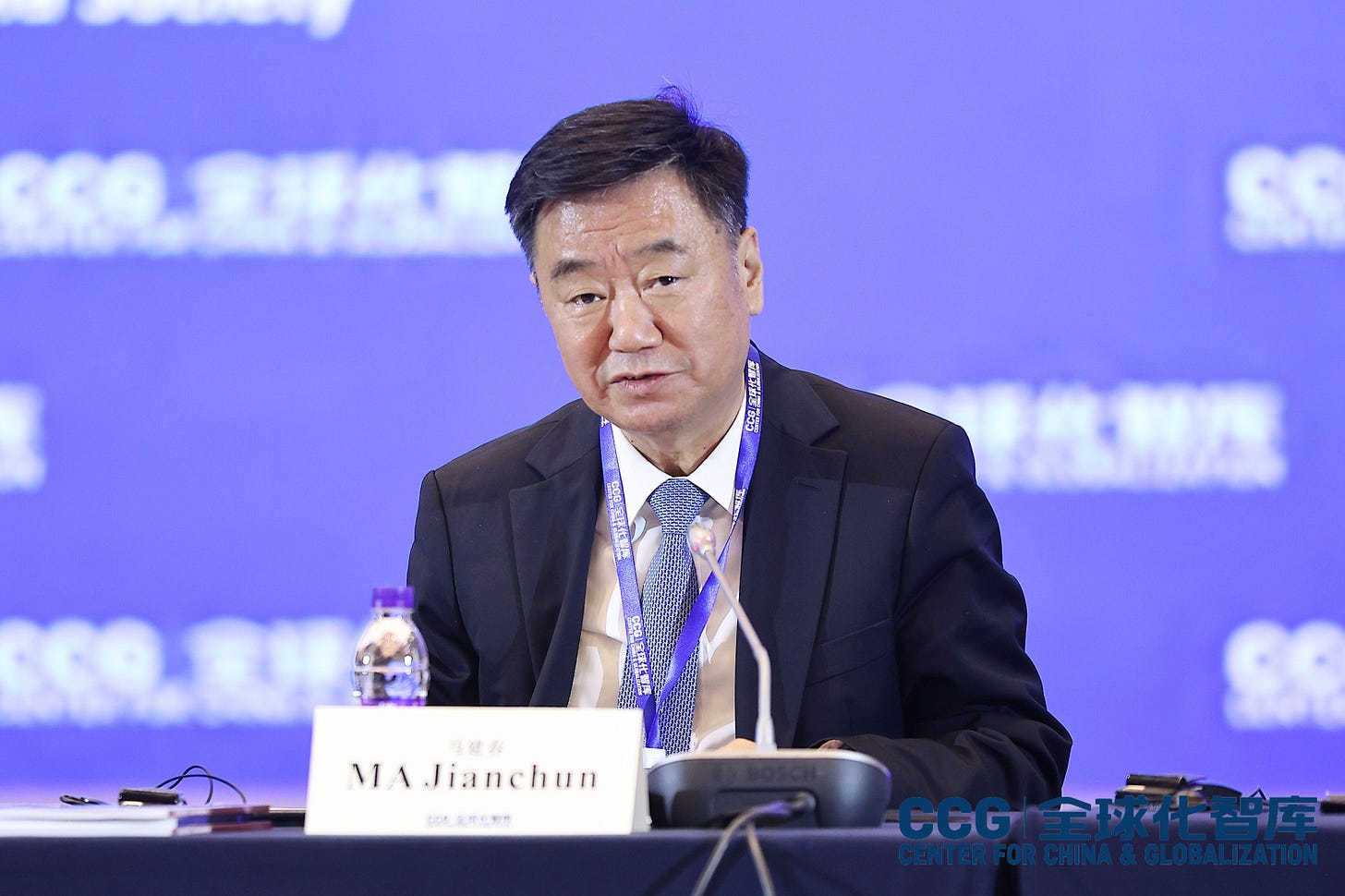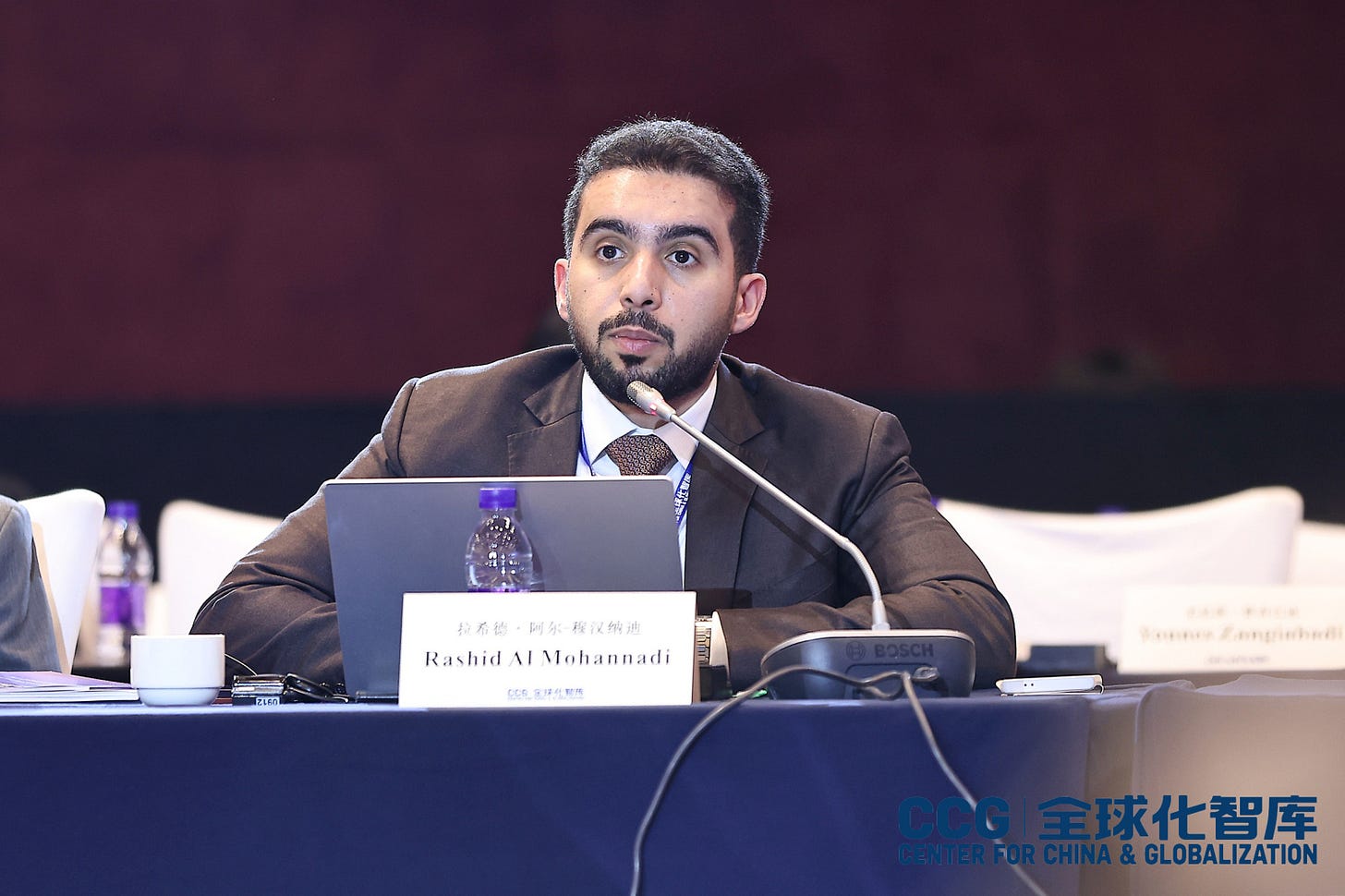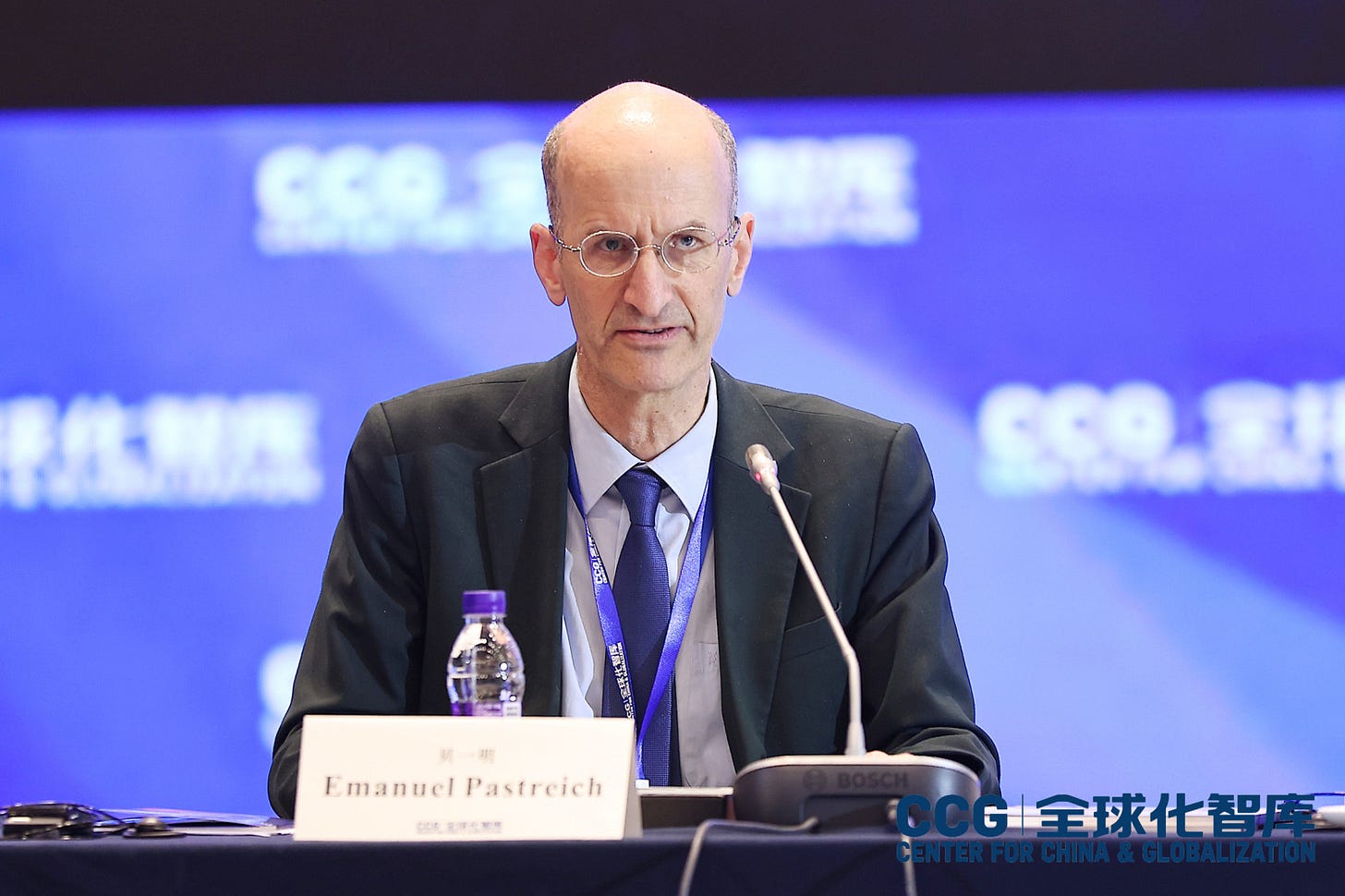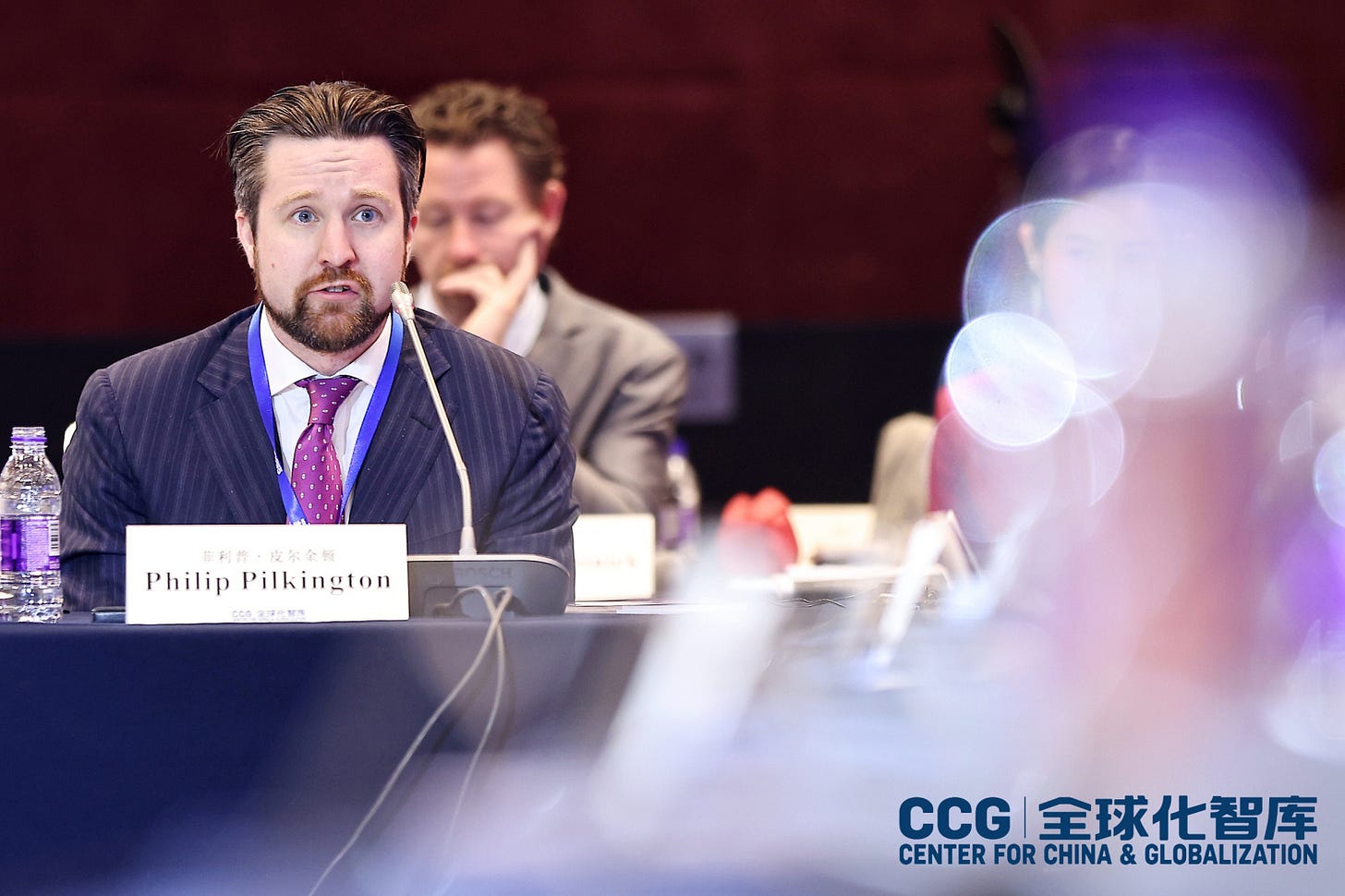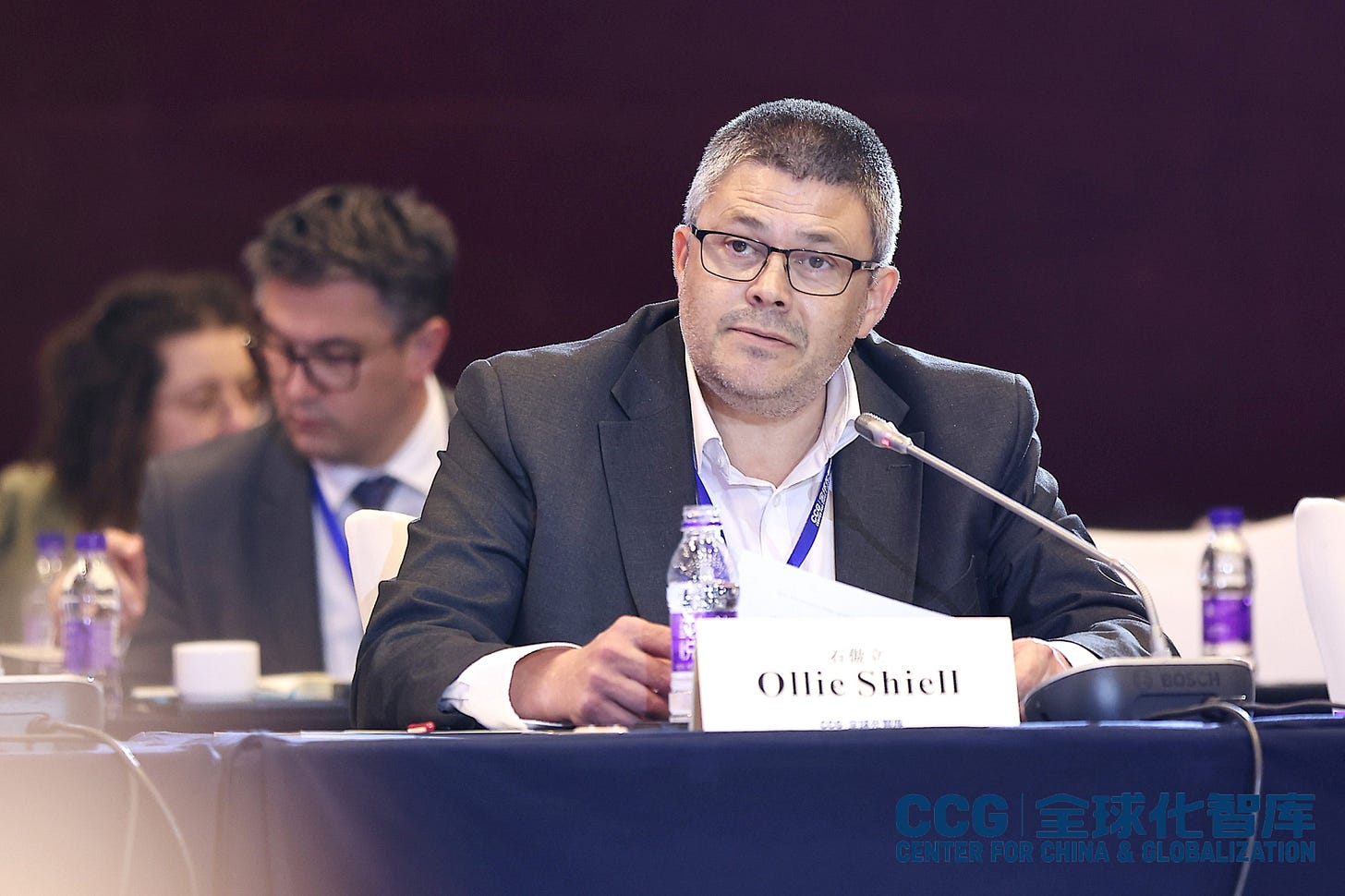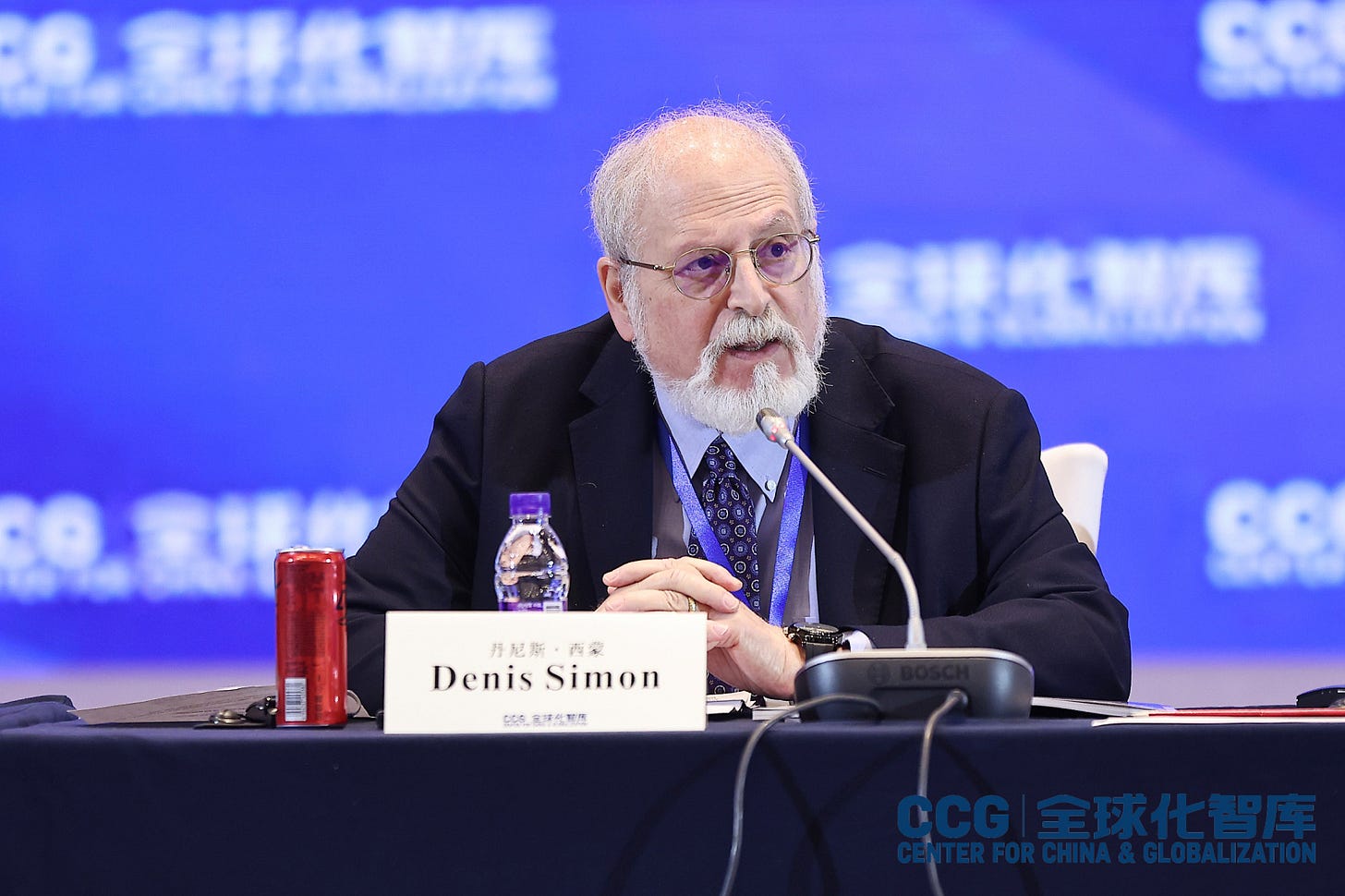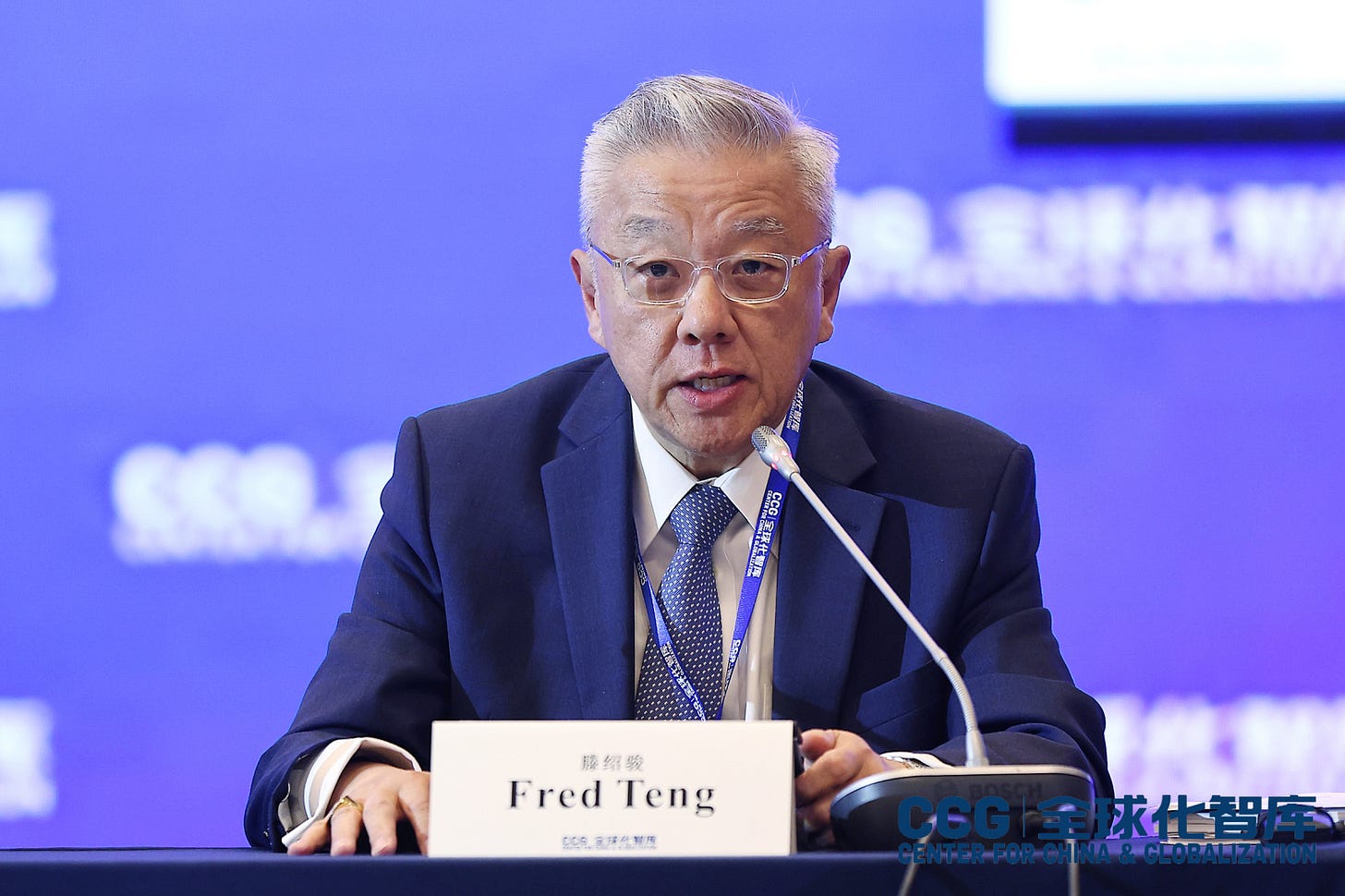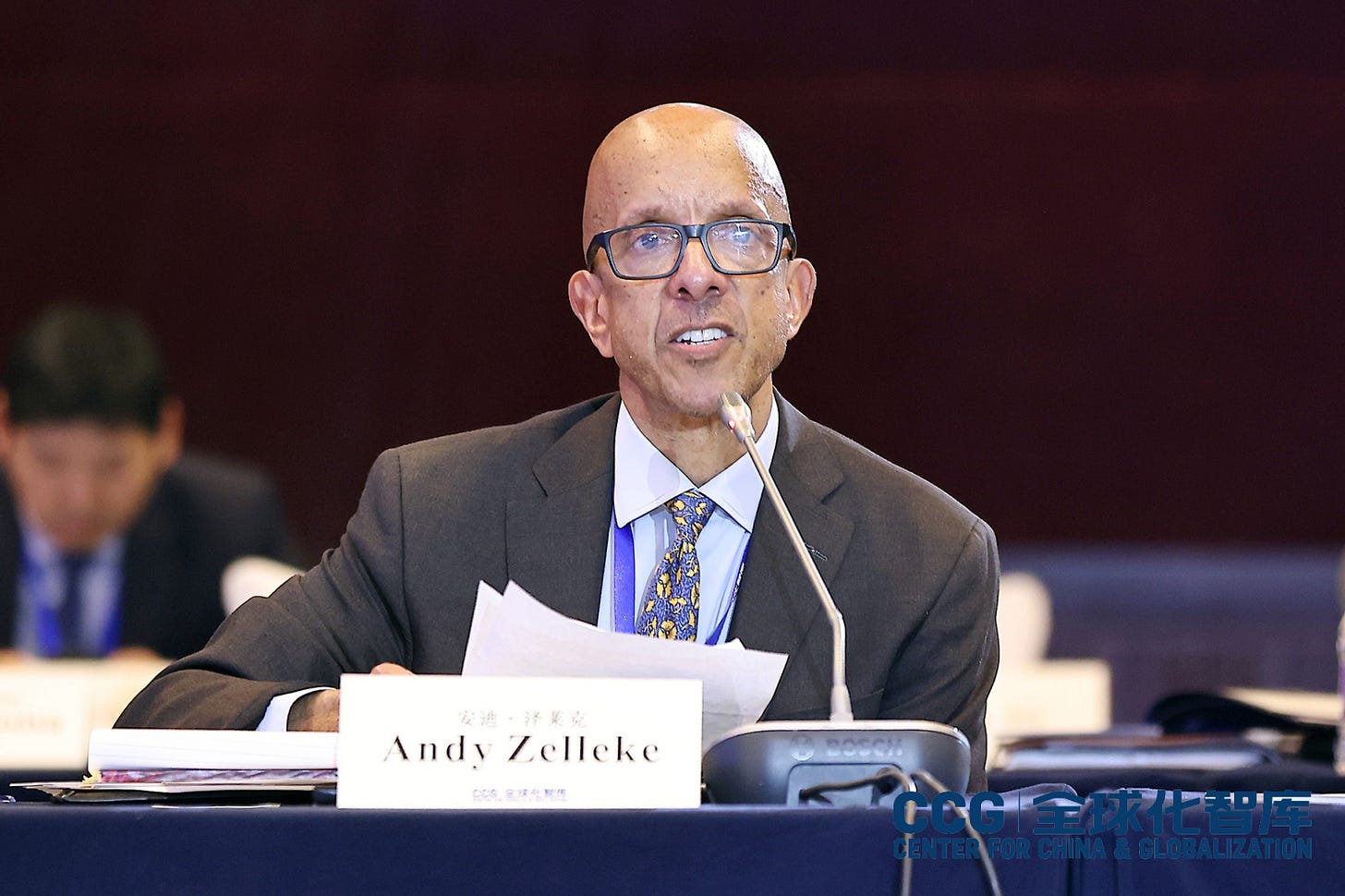Transcript: U.S.-China Trade War Narratives in an Era of Great Power Competition: Perceptions and Realities
Partnering with the Asia Society, this is part 3 of the 11th China and Globalisation Forum in Beijing on May 22-24, 2025
This is the transcript of the roundtable themed “U.S.-China Trade War Narratives in an Era of Great Power Competition: Perceptions and Realities,” from the 11th Annual China and Globalisation Forum.
The forum, jointly convened by the Center for China and Globalization (CCG) and the Chinese People’s Association for Friendship with Foreign Countries (CPAFFC), and co-organised by the Academy of Contemporary China and World Studies (ACCWS) and the China-United States Exchange Foundation (CUSEF), ran a three-day agenda from May 22 to 24.
The video recordings of the forum have been broadcast and remain available on the Chinese internet, as well as CCG’s official YouTube channel.
Following the opening ceremony and opening roundtable, this session was co-chaired by:
Henry Huiyao WANG, Founder and President, CCG; Former Counselor to China State Council
Jing Qian, Co-founder and Managing Director, Center for China Analysis (CCA), Asia Society Policy Institute
Featuring special remarks by:
HUANG Ping, Former Chinese Consul -General in New York
Kyung-wha Kang, President and Chief Executive Officer, The Asia Society, Former Minister of Foreign Affairs of South Korea
Roundtable speakers included:
Doug Bandow, Senior Fellow, CATO Institute
MA Jianchun, President, China Society for WTO Studies; Former Chinese Ambassador to Gambia
Rashid Al Mohannadi, Nonresident Fellow at the Middle East Council on Global Affairs
Emanuel Pastreich, Founder and President, The Asia Institute
Philip Pilkington, Chief Economist and Senior Fellow, Hungarian Institute of International Affairs
Ollie Shiell, Chief Executive Officer, UK National Committee on China; Executive Chairman, Asiability
Denis Simon, Visiting Professor in the Asian Pacific Studies Institute, Duke University; President, Alliance of Global Talent Organisations (AGTO)
Fred Teng, President, America-China Public Affairs Institute (ACPAI)
Andy Zelleke, Senior Lecturer, Harvard Business School
The transcript is based on the video recording and has not been reviewed by any of the speakers.
Roundtable | U.S.-China Trade War Narratives in an Era of Great Power Competition: Perceptions and Realities
Henry Huiyao WANG, Founder and President, Center for China and Globalisation (CCG)
Good afternoon. We’re still waiting for another host, but let me go ahead and start. It’s an extreme pleasure to welcome all of you to this important roundtable discussion this afternoon. We are going to talk about U.S.-China relations. It’s important timing, and we’re very honoured to have Her Excellency Kyung-wha Kang, President and Chief Executive Officer of The Asia Society and former Minister of Foreign Affairs of South Korea, who has joined us personally for this conference. I am also pleased to welcome Ambassador Huang Ping, the former Chinese Consul-General in New York for the Ministry of Foreign Affairs for six years, who has just returned. He is now the Vice President of the China-U.S. People’s Friendship Association in Beijing.
As we can see, as the second Trump administration took over, there have been many new developments lately, particularly in the trade arena and the tariff war we’ve witnessed over the past month. Fortunately, significant progress was made in Geneva, and hopefully, that progress will continue. U.S.-China relations are among the most important bilateral relationships in the world, and it is very important that we maintain and safeguard this relationship. It’s equally important to prevent misconceptions, miscommunication, or miscalculation. There are many misnarratives and miscommunications going on between the two countries, so it is great that we have gathered here to clarify and further study some of those issues.
The Center for China and Globalization and The Asia Society are deeply committed to continuing this dialogue. We are focused on addressing these miscommunications and misnarratives. Dr. Kang has a PhD in communication and is excellently positioned to participate in this discussion. Additionally, her experience as a former Prime Minister of South Korea gives her a unique third perspective on the ongoing developments. Now living in New York and having travelled to China many times, she is well-placed to offer valuable insights.
We are also pleased to have Qian Jing, Managing Director and Co-founder of the Center for China Analysis at Asia Society Policy Institute in New York, co-hosting today’s session. Jing Qian, would you like to say a few words? Following that, we can invite Dr. Kang and Ambassador Huang to deliver their opening remarks.
Jing Qian, Co-founder and Managing Director, Center for China Analysis (CCA), Asia Society Policy Institute
Thank you, Henry. Again, my late arrival is a case in point of the importance of communication. I was told to come here at two o'clock, which I arrived, but apparently we started a little bit earlier. Thank you, Henry, for co-hosting this with the Asia Society and Center for China Analysis.
This is a continuation of a very useful conversation we had in New York of the importance of clear misperception and to have the right perception between U.S. and China. I’d like to just offer a couple of framing points, and we have many experts and key interlocutors with many years of experience, Ambassador Huang and Minister Kang, to open for us.
In China, we have a saying called "知为行之始", from Da Xue Zhang Ju, which basically means the beginning of wisdom is the definition of terms, to quote Socrates. And I do think the convergence of wisdom of the East and West is to establish the right perception of self and others, particularly in this era of misinformation and fake news. And I think only the right perceptions of self and others can lead to right actions and good outcomes.
In China, we often say that we should—or the Americans should—establish 对华正确认知 the right perception of China. But here, I’d also like to ask all of our speakers to think about how can we establish, 对美正确认知 the right perception of the U.S.? I think from some of the experiences participating in this trade talk, I think both right perceptions of the U.S. and China contribute directly to the success of the Geneva talk, which is a very good start.
We do have a lot of experts speaking on the right perception of China. Perhaps a couple of examples of the perception of the U.S., as food for thought for people to discuss. One is that, is "America First" really anti-China? Not necessarily, I think as the Liberation Day tariff is really global, they are actually serving US domestic politics and economic purposes.
As important as China is, as I constantly remind our friends in China, it is, unfortunately and fortunately, that China is not always on the top of the presidential agenda. So that’s the first point I want to share.
The second one is that, is President Trump really an isolationist, or is he more non-interventionist? Maybe he has no ideological leaning—whatever works. Again, serving his domestic political and economic agendas.
And the third one, MAGA—is it really anti-establishment, or MAGA a new establishment? There are many other prompts I can put on the table, but just to put a few of those on the table to prompt some discussions.
But again, I think to establish some of the right perceptions of the U.S. will be critical for the sustainable U.S.-China right perception and sustainable outcome of the trade negotiation and action, as Madam Kang has mentioned in the morning.
So with that, I turn back to you, Henry.
Henry Huiyao Wang
Thank you, Jing. Probably to start with, I would like to have the opening remarks for this special section on the special roundtable section on the "U.S.-China Trade War Narratives in an Era of Great Power Competition: Perceptions and Realities." I will start with Ambassador Wang Ping to give us an opening remark.
Huang Ping, Vice President, China-U.S. People’s Friendship Association (CUSPFA); Former Chinese Consul-General in New York and Chicago
Thank you so very much, Henry. Your Excellency Dr. Kang, Managing Director Qian Jing, distinguished guests, ladies and gentlemen,
It’s a great honour to attend the 11th China and Globalisation Forum. I would like to thank you, CCG and Asia Society Policy Institute, for co-hosting this highly strategic dialogue, as well as all to the distinguished guests for your active and insightful participation.
The theme of the roundtable, “China-U.S. Trade War Narratives in an Era of Great Power Competition: Perceptions and Realities,” is highly relevant. In recent years, China-U.S. relations have experienced twists and turns, with existing issues in bilateral ties being magnified. The noise of decoupling has grown louder, and the narratives of trade wars and great power competition have become more prominent.
But is this narrative truly reflective of reality? In fact, China and the U.S. are not only the world’s two largest economies but also each other’s major trading partners. The two countries share extensive common interests and have both benefited from decades of cooperation.
In the past two years, for example, bilateral trade has stayed above $660 billion. American consumers still continue to thrive on Chinese products, and tens of thousands of U.S. businesses remain deeply engaged in the Chinese market. Supply chains of the two countries are highly interwoven, and educational and tourism exchanges have shown remarkable resilience.
But narratives matter. Narratives shape perceptions, and perceptions shape policies. If we define China-U.S. relations through the lens of great power competition, we tend to arrive at more confrontational conclusions. When we view economic and trade interactions through the lens of a trade war, we not only exaggerate differences but also narrow the space for dialogue and cooperation.
In truth, great power competition is not the defining feature of China-U.S. relations, and the trade war is nothing more than a manmade disaster. History and reality have taught us that China and the U.S. stand to gain from cooperation and lose from confrontation.
As a diplomat with over 40 years of experience, having served in New York, Chicago, Washington, Ottawa, and Harare in Zimbabwe, I deeply understand that interactions between nations depend not only on high-level official engagement but also on mutual understanding and trust between peoples.
As Vice President of the China-U.S. People’s Friendship Association, I’ve always believed that the feature of China-U.S. relations lies in the people. The cultural ties between ordinary Chinese and Americans form the most profound and resilient foundation for bilateral relations.
The common interests between China and the U.S. far outweigh differences. If the two sides adhere to the principles of mutual respect, peaceful coexistence, and win-win cooperation, we will surely find the right way to get along and achieve shared prosperity. Narratives of decoupling or confrontation should be rejected.
We should advocate for finding common ground and meet differences while managing rationality and restraining competition. Hostility and confrontation should not dictate the course of China-U.S. relations, since friendship is not a zero-sum game.
The future of China and the U.S. does not only concern the two countries themselves but also global stability, development, and prosperity. Employment, supply chains, climate change, and global health, these are all pressing global issues that require cooperation between China and the U.S., as well as our shared wisdom and a sense of responsibility.
In this area of uncertainty, platforms for dialogue like today’s forum give us hope. As long as we are still willing to listen and sit down to talk, it means we still believe that we can find common ground, that understanding can overcome bias, and that dialogue can reduce conflict.
In closing, I would like to quote an ancient Chinese saying: “A single tree does not make a forest, and a single string cannot produce music.” Just as this proverb suggests, no country can thrive in isolation. Only through joint efforts and mutual respect can we build a peaceful, stable, and sustainable world. Thank you.
Jing Qian
Thank you, Ambassador Huang. As always, I can't agree with you more. Dialogue can truly prevent conflicts and clear misperceptions, as the very essence of the dialogue that CCG has conveyed today.
Now, I’d like to turn to Minister Kang for your opening special remarks.
Kyung-wha Kang, President and Chief Executive Officer, The Asia Society; Former Minister of Foreign Affairs of South Korea
Thank you very much, Jing, and thank you very much, Henry, for hosting this roundtable. I think of all the roundtables organised around this forum, this is probably the most interesting, not because I’m part of it; because I think this is the issue of the day: the U.S.-China relations, the trade relations, and all the misperceptions and misunderstandings that have fed this tension.
This is a continuation of the conversation that Asia Society and the Center has had in New York a couple of weeks ago, and we thought it would be wonderful to continue the discussion with thought leaders from other parts of the world.
Yes, I majored in Effective Communication. But the first rule of effective communication is, of course, to be a good leader, and that is extremely hard, even among best friends and individuals. But if you’re aiming for effective communication between governments and countries, you know there are institutional agendas coming in, their individual leadership styles coming in. So, the difficulty of effective communication and accurate perception is all the more difficult.
And add to that, the current era where the anti-China rhetoric is so pervasive in the United States, wherever you go. And there doesn’t even seem to be an attempt to question whether these assumptions and understanding about China are accurate or not, factual or not.
And that is why the work of our center, the Center for China Analysis, is doing an extremely important work, because it is factual, evidence-based analysis of what’s going on inside China. And there are thought leaders in the United States, in the administration, that do appreciate this kind of a factual, accurate understanding of developments in China and China’s approach to these issues.
The level of misperception, misunderstanding, I think, was clearly playing out prior to the Geneva talks. For weeks, we were hearing from the Americans, “Yes, talks are happening.” Beijing was saying, “No, there’s nothing happening.” And boom, Geneva happens. So clearly, something was not spelt out publicly, maybe intentionally not. But clearly, there was a huge gap between what Washington was saying, what Beijing was saying, and that left policy thinkers around the world in a quandary.
But I think we are hugely relieved that the Geneva talks did lead to an outcome. That is a huge relief, but also promises further consultations and negotiations in the 90 days. There’s very little news since then, and I tend to think no news is good news, probably. I can only hope that there are responsible stakeholders and key people on both sides continuing that discussion, so that at the end of the 90 days, we will get something more lasting and more stabilising.
So with those just off-the-cuff remarks, I am, you know, very honoured to be a part of this roundtable discussion and really eager to hear the thoughts and views to be expressed by our participants. Thank you.
Henry Huiyao Wang
Thank you, Minister Kang. Excellent. Absolutely, I still remember very well a few weeks ago, we were in the Asia Society office in New York, and we discussed a lot with Jing Qian there, who chaired that meeting, on this misconception and gap we have today.
So, we’ve been discussing with Asia Society, and we have come up with some questions, for example:
To what extent are current U.S.-China trade tensions driven by economic realities, and how are these dynamics interpreted by the public, media, and policy elites in both countries?
What role can narratives play in either escalating or de-escalating trade tensions, and how might dialogue platforms and expert diplomacy shape a more constructive bilateral trade future?
How are evolving trade war narratives within the U.S. and China contributing to the deterioration or recalibration of bilateral ties under the second Trump presidency?
What role do media, think tanks, and political discourse play in shaping public perception and elite policy narratives on both sides—and how can this influence be redirected toward more constructive engagement?
How are third parties—such as Europe, the Global South, and international institutions like the WTO—responding to or being impacted by the ongoing US-China trade dynamics? In a polarised international environment, is there room for a new strategic framework or narrative architecture to manage the trade tensions between the U.S. and China?
So, there are a lot of questions that we have in mind. But what I do is I rotate the chair with Jing Qian. I know Doug, you have something to go first. Maybe, Doug, you can start first as a U.S. think representative here and also a former advisor for the Reagan administration. So, Doug, please.
Doug Bandow, Senior Fellow, CATO Institute
Well, it’s certainly a pleasure to be at the forum and to discuss these issues, though they’re rather painful, frankly, to discuss. As we look at U.S.-China trade relations today, it’s tempting to think of it as only Donald Trump. But these long have been controversial in the United States. The issue of most favoured nation trading status for China under the Clinton administration was a major political battle. And there have been, you know, hawks who have argued in recent years that the United States made a major mistake by granting that, because it empowered China and has now created what they view as a very dangerous rival.
So, these sentiments are out there, even separate from Donald Trump. It’s trade, but it’s also sovereignty, it’s also national security, ot’s also politics. It’s so much more, especially in the United States, but I think other countries very often as well.
And with China and the United States, there really are two levels of trade issues. One is that Donald Trump is a mercantilist, and his economic theories, in my view, are kind of 19th or 18th century. And he’s THE most important American politician who holds those views, and the only one who has had the power to implement them.
So, that’s going on now, and he has various ideas in mind. He wants to raise money, he wants to push other countries’ barriers down, and he also wants to have some idea of reciprocal tariffs, all of which contradict one another. So, exactly where he’s going in general is hard to know.
The other issue is China. And I think that as we look at the trade issue with the U.S. and China, it ties into the larger vision that has taken over Washington, of both parties, of a geopolitical struggle. So, it gets into the question of high-tech, whether it be semiconductor chips, AI; it gets into the idea of supply chains; it gets into the idea of things like rare earths and dependency on those.
All of these issues are kind of swirling around. So, it’s very hard to know exactly what he wants and what would satisfy him at the end of this negotiation.
But I do think he wants to do so. I think he is not as hawkish as many of the people around him. He does seem very genuine in not wanting war. And that is something again, given his policies, you might question that. But I think that, in fact, that is very fundamental to his viewpoint.
So, I have some hope that, having seen a de-escalation of the conflict on tariffs, that there really is a chance to have a serious negotiation.
And my hope is that what comes out of that will not be decoupling and radically pulling apart the U.S. and China, but rather a much narrower attempt to define areas that both countries view as very important, preeminent, very security-oriented, and set those aside, and then open up cooperation elsewhere.
The question of narrative, I think, is important. The perception that is out there is that, from his standpoint, trade is a rip-off. What’s interesting in the United States, at least, is under his first term, he lost ground with that argument, that the American people were more pro-free-trade at the end of his administration than at the start.
The fact that it was debated, and other groups, including my think tank, entered in, actually convinced people that trade was mutually beneficial. So, I think this is not an issue that we should give up on; that indeed, we can win this.
In a sense, what we want to do is move from “me/us,” what is trade for me, to “we/all of us,” that is, trade benefits all of us. Trade is a way to bring poor people into the international circle of exchange. It’s a way to expand opportunity, to expand access to technology. The trade in China, as a positive example, has had an enormously positive economic impact. It enriches, it empowers, it brings poor people and makes them, in many ways, equal to people of better means.
And what we need out of that, then, I think, is constructive engagement at all levels of our societies, which is one reason I view these kinds of exchanges as being very useful.
I am often asked why I come to China. I have family members who are very concerned that terrible things might happen to me as I disappear off to this colossus somewhere in the east, which is very mysterious to them.
Nevertheless, these exchanges, in my view, are extraordinarily important, and I think particularly between the United States and China. They must continue, that we must better understand each other, have a dialogue, and make very clear that we can together progress in positive cooperation and positive benefits.
There are going to be challenges along the way, without any question. And this moment is a very challenging one for those of us who believe in U.S.-China relations as well as free trade.
But I believe that we can win this. And my, I guess, my message for everyone here is, don’t give up. I believe we can win the intellectual battle. I think that we can help turn around the political battle. And even Donald Trump, I think, wants to work something out that is much better than that of many people in my country want. In fact, Donald Trump sees a more positive future for the United States and China, and one that we could at least live with and build upon in the future. That, I think, would get us further from where we are today. Thank you.
Jing Qian
Thank you, Doug, very much. I think many of what you said are music to my ears. I particularly like what you said about winning the intellectual battle, and we can possibly win the political battle. And I also agree with you that President Trump is overestimated in his destructive nature, and I think his peace-loving nature is underestimated as well. I’m a strong believer in human agency, and particularly when that’s backed by evidence-based change, as you said, the CATO Institute has successfully convinced the general public about the benefits of trade. Thank you for showing that positivity.
Now, we turn to Ambassador Ma. Ambassador Ma is the President of the China Society for WTO Study under the MOFCOM. So, Ambassador Ma, looking forward to your insights.
Ma Jianchun, President, China Society for WTO Studies; Former Chinese Ambassador to Gambia
Thank you, Mr. Qian. Your Excellencies, dear guests,
It’s my great pleasure to participate in today’s forum. So, talking about the U.S.-China trade war and talking about China-U.S. economic relations, there are many dimensions. I’m from the Society of China WTO studies. Sp, you know, more focus on the multilateral trade principles. So I will say some work like this.
So, today, my remarks will start from topic five of this discussion afternoon, which is, how are third parties responding to the impact of the current situation?
So, I would like to say something about China’s response at first. When the U.S. began to impose reciprocal tariffs on China, China fought back. Then, the U.S. imposed retaliatory tariffs on China, China also imposed retaliatory tariffs so that it escalated to 145%. Why did China do this? We should understand well.
First of all, China is prepared. While many people around the world are talking about uncertainty, China believes that there is certainty. That is, when Donald Trump came back to being president again, he will definitely increase tariffs on China. So, that’s certainty. Including Chinese companies, they also have these kinds of predictions. So, China has prepared.
Second, the imposition of the tariffs is only part of the high-pressure measures of the Trump administration. We believe that if you bow your head and accept his reciprocal tariffs, he will continue to put pressure on you. So, China has only this option to resist him and prevent him from continuing to pressure.
Third, China’s opposition to the U.S. reciprocal tariffs, just like the Chinese government said, is not only to show China’s toughness, but also to persuade the Trump administration to return to the WTO and to return to the trade dispute settlement mechanism under the framework of the WTO. I’m doing this kind of job. So I believe that. We try to show them that we should have a multilateral trade framework to talk about this. That’s why we try to keep up with this principle.
Because all WTO members have lowered tariffs to basically responsible levels and promoted trade facilitation. Why can America change this overnight? So, if the United States does this, if other WTO members follow the example to do this, international trade will fall into chaos, and the multilateral trade rules that WTO members have worked hard to form will be destroyed.
Therefore, China counterattacked to the U.S. reciprocal tariffs. This is not only for China, but also to actively uphold the multilateral trading system.
So, my friend, now you see China and the United States held consultations in Geneva and reached a preliminary consensus on some issues.
What I mean is China’s approach provides an example for Europe, for the Global South, and for other WTO members. This example is, we try to bring the negotiations back to the WTO framework. So, this is our suggestion.
And now, the question is how to manage the tensions. Now, after the negotiation in Geneva, China and the United States have agreed to suspend the 24% reciprocal tariffs for 90 days. I hope the 24% tariffs should be permanently abolished, and then we can continue to negotiate to eliminate the other 10% of these reciprocal tariffs.
So, we call on WTO members to work together. We try to go in this direction. And China and the United States need to negotiate the removal of the fentanyl tariffs on China, because China cannot be blamed for the abuse of fentanyl. For other kinds of tariffs, [we should] keep talking and negotiating.
Now we are happy to say a consultation mechanism has been established between China and the United States, and I hope this negotiation process can be accelerated in the coming future. Thank you very much.
Henry Huiyao Wang
Thank you, Ambassador Ma, from the China Society for WTO Studies of the Ministry of Commerce. Absolutely, we hope to continue the discussion, and we can get the 20% of fentanyl tariffs off and also let’s settle the final 10% with us as well. So, thank you for your recommendations.
Now, we’d like to have Rashid Mohannadi say a few words. Because we are tightly scheduled and we have many speakers, maybe we’ll manage the time. Thank you.
Rashid Al Mohannadi, Nonresident Fellow at the Middle East Council on Global Affairs
Thank you, thank you very much, Mr. Wang. I’ll make sure that my remarks are brief.
I’d like to start with some news. Just days ago, Colombia started the process of joining the New Development Bank, known as the BRICS Bank. This wasn’t purely a financial decision. It was a statement. Colombia, long anchored in the Western Hemisphere, made a deliberate choice to align with an institution born out of the Global South. So, this shows the new dynamic when it comes to South-South cooperation.
Now, let’s talk about the U.S.-China trade tensions. There is no doubt that they are rooted in genuine economic concerns, competition in semiconductors, AI, green technologies, and supply chains. But they are also sometimes shaped by distorted and powerful narratives.
The U.S. elites increasingly frame the relationship with China as one of betrayal. They feel that the liberal economic order they helped build has been weaponised against them. The public, often influenced by media sensationalism, unfortunately, sees China not as a trade partner but as a threat to American jobs, security, and values.
Meanwhile, China frames itself as a rising nation asserting its rightful place, still as a developing country, but one determined to lead the next generation of technologies.
These competing narratives aren’t just media spins. They are reshaping public opinion, hardening political stances. But more importantly, they are leading policy.
So, I’ll keep my recommendation short. My first recommendation is we need to desecuritise trade narratives. Instead of framing tech transfers and supply chains as existential threats, we need to recognise them as areas of competition and potential cooperation.
The Global South relies a lot on tech transfers from both China and the U.S. Platforms like the NDP, the AIIB, and regional trade frameworks in the GCC and Southeast Asia can serve as a neutral space where they can mediate, not escalate, tensions. History teaches us that economic, technical, and cultural exchange will happen nevertheless.
My final point will be the of point of third parties. So, what do we mean here by third parties? Third parties like the EU, the Global South have a defining role in potentially managing these tensions between the U.S. and China. If you remember in my earlier remarks, I mentioned that the prominence of global bridge cities like Doha can act as areas of mediation and collaboration, and a place to convene.
In the end, both the U.S. and China are thankfully having discussions now, as one of my fellow speakers mentioned. And I think it is in both countries’ interest to continue the discussion. And again, economic and technical transfers will happen nevertheless. Thank you, xie xie.
Jing Qian
Thank you very much for your very constructive suggestions, as in desecuritisation is going to be a critical next step. We have advocated for U.S.-China clean tech collaboration in third countries, Southeast Asia, the Middle East, and the Global South for a long time. It’s going to be increasingly challenging, but at least mutual constructive non-intervention can be a reasonable next step. Thank you for that.
I think next, we’re going to Emanuel, the founder and president of the Asia Institute. We look forward to your insights.
Emanuel Pastreich, Founder and President, The Asia Institute
Thank you very much. And as an American, I think I’d like to address the United States. The biggest concern has been the breakdown of scientific intellectual discourse in Washington, DC, which affects trade but affects everything. And so, I guess I would say the most critical issue for us is science. And I want to stress this in two respects.
One, there is a very common misperception that science and technology are related. They’re, in fact, opposites. Science is the pursuit of truth through a methodology which is essentially philosophical, of ascertaining what is accurate or inaccurate through a rigorous intellectual process.
Technology is something that produces an effect, something like what we generally label as AI, which can be scientific or it can be the complete opposite. And we need to focus on science, especially in the United States, which is now cutting back so severely on scientific research.
Also, in the American case, America has fallen into this unfortunate trap of stressing democracy and downplaying science. Democracy, the reflection of the opinions of large numbers of people, is critical for policy. But science is not determined through voting, and scientific truth is not determined in that manner.
So, stressing in the United States a scientific approach, whether it’s to policy in general, to trade, and to other aspects of our administration, is absolutely critical. Science is a basis for cooperation with China and other countries. I would say the centre for American-Chinese cooperation would be basic science research.
Science should be the basis for policy, especially encouraging scientific thinking and rational intellectual behaviour on the part of citizens, something which the United States is moving in the opposite direction.
So, I don’t criticise Donald Trump on his trade policy, but I am very critical of him on his radical anti-intellectual position, which is extremely dangerous for the United States, especially on the issue of education for average Americans.
Also, science is critical when we’re addressing the very fundamental problem of the concentration of wealth. So, increasingly, a very small number of people are able to control large amounts of information and assets, and they are using this as a weapon.
The most effective way to respond is to demand a scientific dialogue based upon the confirmation of truths. And that is really the basis for the long-term interest of the United States, but for humanity as well, since we have to think long-term.
So the question is going to be where we’re going to be in a hundred years, in 200 years. And I think if we look at it in those terms, a lot of the policies being pursued today will be catastrophic.
And finally, I would say that science is a way to avoid the drive for war, which is increasingly based upon technological solutions.
Technology obviously can play a very important role in our society. But if it does not have a scientific basis for confirming its application to society and its function, then it can be extremely dangerous. Thank you very much.
Henry Huiyao Wang
Thank you, Emanuel. Now, I would like to hear from Philip Pilkington, the chief economist and senior fellow at the Hungarian Institute of International Affairs, a well-known think tank in Budapest.
Philip Pilkington, Chief Economist and Senior Fellow, Hungarian Institute of International Affairs
Thank you very much. I think the meeting in Geneva showed that the highly aggressive tariffs are probably not going to come back. I think the Trump administration realised how damaging they would be to the United States economy. And I think that’s probably behind us.
But I would like to highlight an issue that I think is going to become an increasing issue over the next few years. And that can be shown in the impact that Liberation Day, so-called, had on the U.S. financial markets.
I think there’s extensive evidence now that the Liberation Day policies may have signalled the beginning of the end of the U.S. dollar as the global reserve currency. I’ll give you a single example of this. I won’t bore you with financial details. I’m sure people don’t want to know it. But typically, when equity markets sell off, U.S. bonds are bought. It’s called a rush for safety in markets. That is not happening. Both are selling off at the same time. That’s a bit of a red flashing light to me.
What this will mean, if true, is that the global economy could face a rebalancing, regardless of the policies that the Trump administration carries out moving forward. In fact, it may face a rebalancing in spite of any policies that any government pursues.
This may not be an inherently bad thing, but it does risk instability. It risks inflation in the United States with a declining dollar, and it risks financial market instability in China, especially given the fact that the capital account is closed. It might become more difficult to manage that.
These dynamics will be exacerbated by any further turmoil in messaging from the current administration, which may or may not come. But there is reason to think—we can’t be certain—but there is reason to think that these processes may have been now set in motion and there may not be any way to stop them.
We see that this week, U.S. government bonds have continued to sell off. If you look at the financial press today, you’ll see that being reported. That is in spite of the fact that the Geneva meeting produced results. So what that’s telling me, at least, is that the financial markets are saying we’re locking this movement in, in spite of the fact that the tariffs have been largely, although not completely, removed. Again, I think this probably speaks to the fact that the de-dollarisation process may actually be taking place.
So, what is the solution to this? Well, the first thing I’d say is that I expect the Trump administration will now pivot, in the next year or two, from talking about tariffs to talking about U.S. dollar policy. And I would hope that the Chinese government would start to consider the same issue now, so that we can get ahead of it. I would propose—obviously, we have limited time here—but I would just put it out there that this may be a very good opportunity to introduce a truly multilateral global monetary system, a real one, a new Bretton Woods system that isn’t based on the U.S. dollar, but is based on a truly multilateral arrangement, as was proposed by John Maynard Keynes in 1944, Bretton Woods.
But even if that doesn’t happen, I think it’s just really worth highlighting that, in the next few years, we will have to have very important discussions around the issues of currency and the U.S. dollar, in particular. Thank you very much.
Jing Qian
Thank you for a very bold proposal, a new Bretton Woods system. This is to be discussed.
Next, we have Ollie Shiell from the UK, the Chief Executive Officer of the UK National Committee on China. Ollie, the floor is yours.
Ollie Shiell, Chief Executive Officer, UK National Committee on China; Executive Chairman, Asiability
Thank you very much, and thank you, Henry. It’s good to see you.
The framing of the five questions emphasises a range of issues which everyone here is familiar with, and we all share concerns. Discussion can perhaps be helpfully focused less on how and why we are in the situation we are, or even who is responsible for current tensions, but rather how each nation can individually and collectively contend with this new dynamic.
In the case of the British government, which has been in place for less than a year, Starmer's leadership team is finding a way to manage by crossing the river by feeling the stones. The British perspective: the government has had to contend with competing levers, compromised of domestic interests and goals as well as international objectives. But for us, it is not about Britain first, but it is also not about enabling another to be THE first.
The Starmer government has demonstrated continuous investment in the free trading system and Britain’s role in it, as demonstrated by the new signed agreements with India, Australia, New Zealand, as well as joining the CPTPP. Whether in the trade and economic system or beyond, Britain is reinvigorating consistency in policy and consistency in diplomacy.
Multilateral, bilateral, and minilateralism remain keen tools, but there are legitimate economic and national security concerns arising out of the economic and political shifts, not least technological innovation. Like all governments, a key priority for Great Britain is finding a balance faced with growing domestic, regional, and international security concerns. Managing these pressures is the reality.
Britain’s focus on how to respond to this challenge has been particularly focused on avoiding over-securitisation whilst also delivering and moving towards a security-informed economy. In this, Great Britain sees neither trade nor diplomatic relations as a zero-sum game. Britain has long had a history and role in the establishment of multinational institutions and the international world order. This approach has been a foundation for trust, cooperation, and consistency.
As the UK government successfully negotiated with the Trump government as the first solution, the British government has demonstrated maturity and tenacity and can be observed as a stabilising example of how it is possible to elegantly deliver a less chaotic recalibration of arrangements.
On China, the UK government will publish its much-anticipated China audit next month, which should provide further clarity on how the UK seeks to grow trade and investment with our friends in China in the pursuit of a security-informed economy.
On a final note, when faced with unpleasant, unpredictable, and disrespectful noisy tones, the best approach is to respond thoughtfully and quietly. It provides others relief and encourages everyone to lean in and consider things more thoughtfully, and this is what we’re doing today. Thank you.
Henry Huiyao Wang
Thank you, Ollie, for coming from the UK to our conference.
Next, I’d like to have Denis Simon. He’s the ex-provost of Duke Kunshan University in China, but also now the President of the Alliance of Global Talent Organisation, a well-known scholar. We’d like to hear from you.
Denis Simon, Visiting Professor in the Asian Pacific Studies Institute, Duke University; President, Alliance of Global Talent Organisations (AGTO)
Thank you, Henry. I want to kind of open this up because parallel to the trade difficulties, I want to talk a little bit about what Emanuel touched on, which is the deteriorating relationship between the two countries in science and technology and in education, and especially the role being played by the U.S. Congress and, in particular, the role by the select committee led by Representative Moolenaar, used to be called the Gallagher committee.
You may recall that in November 2023, President Xi Jinping, during the APEC meeting in his meeting with President Biden, announced that China was going to launch a 50,000-strong programme to bring 50,000 American students to China. And that was well-received, and so far, I think about 15,000 Americans have come over the last two-plus years.
But underlying this are many, many problems. Let me just highlight a few. Three states—Florida, Texas, and Ohio—have already initiated legislation limiting their state university systems from working with countries of concern, in which China tops the list. Six major universities now, like the University of Southern California, are being investigated for being “too chummy” with China, as if there is some kind of “chummy index,” and if you score too high on it, you might get investigated by the Congress.
The University of Michigan was forced to close its very successful joint program with Shanghai Jiao Tong University, again because of a big push by this congressional committee, which has also led to the closure of Georgia Tech Tianjin University and UC Berkeley.
And late last week, as Henry mentioned, I was the former Executive Vice Chancellor of Duke Kunshan. The committee sent a letter to the president of Duke University, asking that they terminate their relationship with that joint venture because Wuhan University allegedly has too many ties to the Chinese military.
The number of Chinese students studying in the United States is on a big decline, from a high of 372,000 in 2019 to 274,000 last year, and probably will go down between 25,000 to 50,000 this year. And the number of U.S. students studying in China is somewhere between 1,200 and 1,400, but it’s nowhere near the high of 15,000 that had existed previously.
And finally, we have a science and technology agreement that fortunately was renewed at the last minute under the Biden administration in December 2024. But that agreement basically lies dormant, and it's languishing probably in the desk of President Trump, who has to decide whether to ignore it or simply cancel it.
So, we are in a very difficult spot with respect to those aspects of the relationship because they had played the role of so-called foundational elements.
Even at a time when the bilateral relationship was experiencing political problems, the trust and understanding in the realms of science and technology and in education had helped steady the relationship. Even during the most difficult moments in June 1989, the relationship continued to be steady by continued engagement in these two areas.
I just want to end by quoting a speech. In her final visit to the United States before she retired, Vice Premier Liu Yandong gave a speech at Columbia University, and this is a good thing about Columbia University. And at that time, she talked about the role of people-to-people diplomacy. And that even in times when the government-to-government bilateral relationship may be experiencing tensions, it is very possible that the people-to-people part of the relationship could play a very important role.
So I’d like to suggest that rather than talking about President Trump and President Xi all the time, maybe we ought to look to a bottom-up solution rather than a top-down. It’s not that the top-down is not important, but it may be that this relationship can be revitalised, restored, and regain momentum through continuing to push on these people-to-people aspects, science and technology collaboration, education cooperation, and maybe if enough momentum is acquired, people in the Congress, people in other positions might get the hint that in fact, the American people and the Chinese people are both heavily in favour of these relationships proceeding ahead.
And I’ll stop there. Thank you.
Jing Qian
Thank you, Denis. I strongly applaud to that. I was at Liu Yandong’s speech, hearing her speaking about people-to-people. Can’t agree with that more. I was also at President Xi’s dinner, where we were co-hosts of the welcome dinner, where he proposed the 50k youth exchange program. I completely agree with your point that science and tech and education exchange is facing a tremendous amount of challenges. And to quote earlier Doug's point, this is an intellectual battle, we have to win, and we have to fight. And there’s a lot of misperception driven by this over-securitisation, as another colleague has mentioned.
I just want to emphasise one point: at the same time, CCA in New York is organising a public event addressing exactly this issue. The U.S.-China deterioration of science and tech cooperation actually having a global consequence because U.S.-China collaboration on science is contributing to over half of the innovation over the past decade as well, but thank you for raising that concern.
Now, I’m going to turn to another veteran of the U.S.-China relationship, the president of the American China Public Affairs Institute, Fred Teng.
Fred Teng, President, America-China Public Affairs Institute (ACPAI)
Thank you. The turbulence of U.S.-China trade relations we face is not merely a clash of tariffs, technology, or trade balance, but rather it’s a contest of narratives.
The Trump 2.0 has injected fresh volatility into bilateral relations that underpin global economic stability. And yet, these actions are often framed less by economic necessity than by the story we tell ourselves, amplified by the media, shaped by think tanks, and weaponised by politicians.
While the U.S. often cites intellectual property theft, market access barriers, and national security risk as economic justification, we must acknowledge that concerns are filtered through political cycles and strategic anxiety. In China, the narrative increasingly centres on resilience, technological self-reliance, and defending sovereignty against U.S. containment. The reality is complex.
Despite conflicts, U.S. and China trade hit historical highs in recent years, and American companies continue to rely on Chinese manufacturing while Chinese firms seek to access global markets.
The public, however, rarely hears this story. Instead, they’re absorbed with a simplified tale of confrontation, of economic nationalism over economic interdependence. Today’s challenge is to shift from a zero-sum narrative of rivalry to one of managed competition, mutual interest, and shared responsibility.
Dialogue platforms like this are critical in rebalancing this discourse. We need diplomats who speak in a language of mutual benefits, economists who analyse trade data free of ideology, and journalists who investigate facts rather than chase headlines. When experts lead the conversation, public discourse can follow with great balance.
The role of media and think tanks is pivotal. In the U.S., public understanding is too often filtered through an adversarial stand. In China, coverage sometimes can harden into nationalism. Both systems have room and responsibility for promoting more fact-based, solution-oriented dialogue.
Institutions at this platform are well-positioned to reframe the debate, not as a war to be won but as a relationship to be balanced. We need cross-border research collaboration, joint business roundtables, and academic exchanges that depolarise the issues and foster shared problem-solving.
Finally, we must recognise that the rest of the world is not a passive observer. Europe, Asia, Africa, Australia, the Middle East, and Latin America are deeply impacted by U.S.-China dynamics, from supply chain disruption to contested standards in AI and climate finance. Third parties are demanding a voice, and they deserve a voice and a stake in shaping global rules.
There’s an urgent need for a new narrative architecture. One that goes beyond confrontation and builds a strategic framework inclusive of all major economies, fair to all nations, grounded in multilateral principles, and responsive to 21st-century challenges. Trade wars are easy to start but hard to justify and even harder to end.
As thought leaders, we must be the guardians of truth and architects of a better story based on authenticity and integrity, and orient towards peace, prosperity, and partnership.
I just want to add, Dr. Kang earlier spoke about the world trade having grown 4,500%. That’s 45 times. So imagine if Henry started with a pie and I counted this table, it’s 40 seats. That means you get a pie, you get a pie, you get a pie, you get a pie, everybody gets a pie. Plus, there are five more pies if somebody wants to come and pick them up. To say that any country’s trade is not fair to another country, I think that we have plenty to go around. It’s really the distribution that needs to be fair; there’s plenty around. And that’s what we should look at. It’s not that there’s not enough. It’s not a zero-sum game. It’s a distribution issue. Thank you very much.
Henry Huiyao Wang
Thank you, Fred. I know you’ve been at the forefront of the China-U.S. exchange and understanding. So, thank you.
Finally, I’d like to have Dr. Andy Zelleke, senior lecturer at Harvard Business School from the U.S. I know you come from Boston. We would like to hear from you as the last speaker.
Andy Zelleke, Senior Lecturer, Harvard Business School
Thank you very much. Very grateful to be here. Let me propose two realities that I think are helpful to understand the trade dispute in context.
First, the U.S. and the PRC have long been operating two very different, both very effective models of domestic political economy that have for some time been colliding in the global economy, without adequate rules of the game for addressing that collision in a manner satisfactory to both parties. The trade disputes ultimately reflect an underlying clash of political economies.
It’s worth noting that China’s objective in deploying its particular political economic model is not to cause collisions. It’s to progress the nation on as fast a track as possible. Still, there’s a collision.
Second, this clash of political economic models and the trade disputes symptomatic of that clash take place within the much broader contest for preeminence in, let’s call it, comprehensive national power. It’s that contest that’s ultimately the main event, and I believe it’s more than merely rhetorical.
All of which is to say that the intense focus on the trade war is, of course, very understandable. But in some respects, it tends to misdirect attention to what are essentially symptoms and away from root causes. It also can mislead us toward a mistaken view that the trade disputes can be meaningfully and sustainably resolved in isolation from the broader issues.
Now, that can sound maybe negative or pessimistic. But I want to take a page from Doug and actually be a little bit optimistic about the possibilities under President Trump. And I say this as someone who voted for his opponent and who disagrees with many of his policies.
Let me give you five quick reasons why something positive in the U.S.-China domain can happen under this presidency.
First, he really does aim to do big things with his presidency. Second, he has a lot more freedom of action as president than his predecessors have had for a variety of reasons. Third, he’s a dealmaker. He drives a tough bargain, but he pays a lot of attention to who is ultimately holding the high cards, as he puts it. The U.S. holds some high cards. So does China. That argues in favour of a deal. Fourth, he has great respect for both China’s achievements and for President Xi, as he talks about a lot.
And fifth and final reason, while Trump does sometimes say rhetorically some quite harsh things about Chinese policies or actions and their effect on the U.S., he also puts the blame much more on his many predecessors in the White House, who, in his view, did not adequately stand up for the interests of the United States. My interpretation of his extensive commentary in this domain is that he views China’s leaders as having done not just what could have been expected but what in some sense they had the responsibility to do from their perspective—push the envelope quite aggressively in this case in the commercial realm to advance the interests of their country.
My own hope is that the trade talks will prove to be mere prelude to very actively exploring whether a grand bargain of some sort going well beyond the trade domain is possible between these two great nations. Thank you.
Henry Huiyao Wang
Thank you, Andy. Excellent five points that we need to look into further to see how we can really work with President Trump. I mean, he is obviously so different from his predecessor, and he has said since his election, 40 times, good things about China. I do see a potential to have more dialogue with him. So, thank you.
I think we probably, because of time, are closing this roundtable. But before we close, because we are also in partnership with the Asia Society for this roundtable, thanks to the Asia Society that came specially for this roundtable that we both organisations host. So, I’d like to have Minister Kang to have some final concluding remarks.
Kyung-wha Kang
Thank you very much. I think trying to summarise all the thoughts and the questions and issues that have been tabled is too much of a mental exercise. But what stood out to me was how we, as a group of thought leaders, really need to push the idea of people-to-people exchanges and how to push against this political drive against science and facts.
I think Fred, your point about how we need diplomats that are thinking of mutual benefits, economists who are ideology-free, and journalists who do their work on fact, gets very much to the kinds of work that are needed on both sides.
I also take the point, I think it was Fred again, and this is something that I wanted to raise as well. We’re so worked up, all of us, on China-U.S. We’ve forgotten about the rest of the world. The rest of the world also has agencies, as continents, as individual countries. And I think if we were to take this kind of a dialogue to, say, South Korea or Singapore or Kenya, Nairobi, or other parts of the world, I think we would end up sounding rather detached from their reality.
So the U.S.-China context is overriding. All countries have important relationships with both, and therefore, this tension in that relationship is the geopolitical context that we all need to govern countries and lead. But that doesn’t mean that other countries don’t have policies and thought leaders. So, I think we need to be much more open to other ideas and other analyses coming from other parts of the world.
So those are some of my takeaways. But I think the importance of people-to-people exchange, and the Asia Society also wants to be a part of the 50k initiative that President Xi announced, but I would hope it's not limited to 50k. That will just be the beginning, and that will lead to another era of very robust people-to-people, student-to-student, scientist-to-scientist, researcher-to-researcher exchange between the United States—and not just between the United States but to the other key players in the global community. India comes to mind, Southeast Asian countries, key players in this. So, we really need to expand our horizons but also deepen the understanding about this bilateral relations.
Jing’s framing of how we really need to question the assumptions that we have. So, if you read analyses coming from the Western media about this trade war, it comes off as if the U.S.’s ultimate aim in this trade war is all directed at China, and the rest is just secondary periphery. But is it? Is the U.S. trade policy only about China? Is the isolationist inclination the stronger one than the interventionist, not just in the President but the decision-makers in his camp?
And MAGA, is that new? Or is it a return to something old in the past? These still are some very relevant questions that we need to constantly ask ourselves. And we also need to ask about China. What is China’s idea about the great rejuvenation? What is China’s idea about all the global initiatives that the President has announced? So far, it remains just rhetoric in the mindset of other parts of the world.
So, that’s the key take I take away: constantly questioning our assumptions because we have a responsibility to make sure that those decisions made are based upon accurate perceptions of the party on the other side of the aisle. Thank you.
Jing Qian
Thank you so very much, Kyung-wha, for these very thought-provoking and profound reflections—to make sure we establish the correct perceptions is step number one, and then to follow with meaningful actions. I really appreciate your reflection. Thank you.
Now, let me turn to Ambassador Huang for some of your final thoughts.
Huang Ping
Well, much has been said. As I first said, rhetoric, narratives really matter. Based on my own experience of three times working in the U.S., I travelled a lot and met people from all walks of life. I found that not many people get a chance to travel to China. They just couldn’t get. All their knowledge about China is from the media, from speeches, talks of politics, which are, on most occasions, not that accurate and far from the fact.
So, based on this rhetoric, like “China eats our lunch” or “America is being ripped off by China,” that’s why people, lots of people, support this MAGA, lots of people believe those are facts, but actually, they are not. The fact is, America benefited hugely and greatly from this globalisation and from cooperation with China, because our economies are highly complementary. We both benefited from that. But ordinary people just have no idea about that. They believe the rhetoric; they believe the narratives.
So, how do you solve this problem? You can’t just let people, all of them, travel to this country. But, at least, we can do little by little—I want to echo Denis Simon—to enhance people-to-people communication, which can play a very important role. Like we keep the doors open, we give exemptions of visas if you’re doing a transfer [visit]. Right now, even if you go to my hometown, for American tourists to go to my hometown, Guizhou, you can stay there without a visa for 10 days, which is 240 hours.
And we have this program, like 50,000 students in five years. President Xi invited them to come to China, and the Ministry of Foreign Affairs, actually, is implementing this. And I recently went to Tianjin Juilliard for commencement, the graduation. Tianjin Juilliard is the only overseas campus of the Juilliard School, in Tianjin. And I’m going to win Wenzhou-Kean in June also for their graduation.
So, if we could keep programmes like this moving, if we could keep this door open wider by having more Americans coming to this country to see the reality, if we could have this forum, like this forum, keep this going, I think, at least, we’re doing something to help people get the right perception of each other. That’s something I want to add.
Henry Huiyao Wang
Thank you, Ambassador Huang. I think that comes to the conclusion of our roundtable this time on Sino-U.S. relations. But I agree with Ambassador Kang, the narrative, the communication, and also exchanges like this are so important that we need more.
The Center for China and Globalization was just in the U.S. about three weeks ago. We had an eight-day trip during the height of the trade tariffs. We talked to many people and travelled to quite a few cities. That is exactly the purpose, I think, of this dialogue, to enhance understanding and communication.
I believe we have the wisdom to solve our issues. Humankind has more common challenges. So, I’d like to thank all of you. And I’ll leave Qian to speak to conclude.
Jing Qian
I have nothing to conclude but to thank everybody for your very thought-provoking contributions. And you give me a lot of hope. I think if all of you around the table in the room can be the negotiation team from both the U.S. and China, we will have a very sustainable outcome. If you will make the team to make the new Bretton Woods system, we’ll have a new Bretton Woods system. But I think the reality is much more complex. That’s why the intellectual battle needs to be won, needs to be fought. I think we need to go out there and communicate. We need to go out there and get in touch with people who are not in the echo chamber, who are not in this cocoon of information, go and talk with them.
Again, I salute your efforts, Henry and all of you. So, thank you all for your contribution. We have to keep fighting. Thank you.



